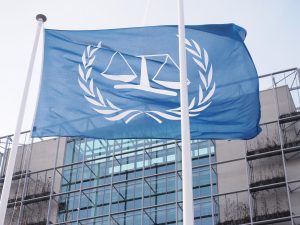Threatened with prosecution over his bloody “war on drugs,” Philippine President Rodrigo Duterte ordered the country’s withdrawal from the International Criminal Court (ICC) in 2019. After the end of his term in 2022, his successor and political ally, President Ferdinand “Bongbong” Marcos Jr., affirmed the decision to stay out of the ICC.
Two years later, the Marcos government has maintained the position of non-cooperation with the ICC but its hardline stance has already evolved.
During the congressional probe about the brutal enforcement of the anti-drug campaign, Duterte testified before the committee and declared that he takes full responsibility for the widespread killings done by the police during his presidency. Asked if he was willing to submit to an ICC investigation, he responded positively and even claimed that the body was taking too long to finish its work.
After he made this remark, Marcos’s executive secretary issued a statement stating that the government would not stop the former president from cooperating with the ICC.
“If the former president desires to surrender himself to the jurisdiction of the ICC, the government will neither object to it nor move to block the fulfillment of his desire,” the executive secretary said in a statement.
It added that if the International Criminal Police Organization (Interpol) will serve an arrest warrant, the government is duty-bound to assist. “The domestic law enforcement agencies shall be bound to accord full cooperation to the Interpol pursuant to established protocols,” the statement said.
Marcos confirmed this in an interview with journalists. “We have obligations to Interpol and we have to live up to those obligations,” he said. But he clarified that the country will neither rejoin the ICC nor provide formal assistance in the ongoing investigation and prosecution with regard to the case involving Duterte.
But the recent pronouncements of the government still represent a major policy shift in dealing with the ICC.
In July 2022, when Marcos became president, he rebuffed suggestions to work with the ICC. “The ICC said it wants to continue the investigation but we’re telling them that we already have an ongoing investigation here at home so why would there be a need for that?”
In September 2022, the Marcos government made a submission to the ICC reiterating the position that “there is no reasonable basis to resume the investigation” into the drug-related killings under the Duterte presidency.
In January 2023, Department of Justice officials asserted that there’s no reason for the ICC to intervene on a domestic issue. “If there’s a working justice system then the ICC cannot come in, and supplant or substitute our working justice system with their own,” they told the media.
But in November 2023, the justice secretary told Congress that the proposal to rejoin the ICC would require a “serious study” before the government could reconsider its decision. This was followed in succeeding months by remarks from several top officials about the prerogative of the ICC to conduct its work in the Philippines and that it can interview witnesses without being facilitated by the government.
A former police general under ICC investigation reacted strongly to the shift in the messaging and accused the government of “betrayal.”
From telling the ICC not to enter the country in 2022 to today’s assurance that it will not block the ICC probe, the Marcos government has subtly but fundamentally modified its policy. It even made an argument about indirectly helping the ICC by citing the country’s obligation to Interpol.
What changed over the past two years?
It is not because of improving human rights commitment on the part of the government but the consequence of the fall-out between the Marcos and Duterte political clans. The rift within the ruling coalition started in the second half of 2023 and worsened this year, which led to the resignation of Vice President Sara Duterte from the Cabinet. The former president has also organized several “prayer rallies” denouncing Marcos’s leadership.
Marcos may or may not initiate the renewal of the country’s ICC membership but what is more important for families of the anti-drug war victims is that the government is not hindering the ICC prosecution of Duterte. For the first time, the government also acknowledged that the local police would help Interpol if the latter makes a request to arrest suspects.
Maybe Duterte was just taunting the ICC when he mentioned his willingness to be investigated by the international body, but he merely gave the Marcos government the opportunity to announce that if an arrest warrant is issued against him, authorities are more than willing to serve it to him.
































